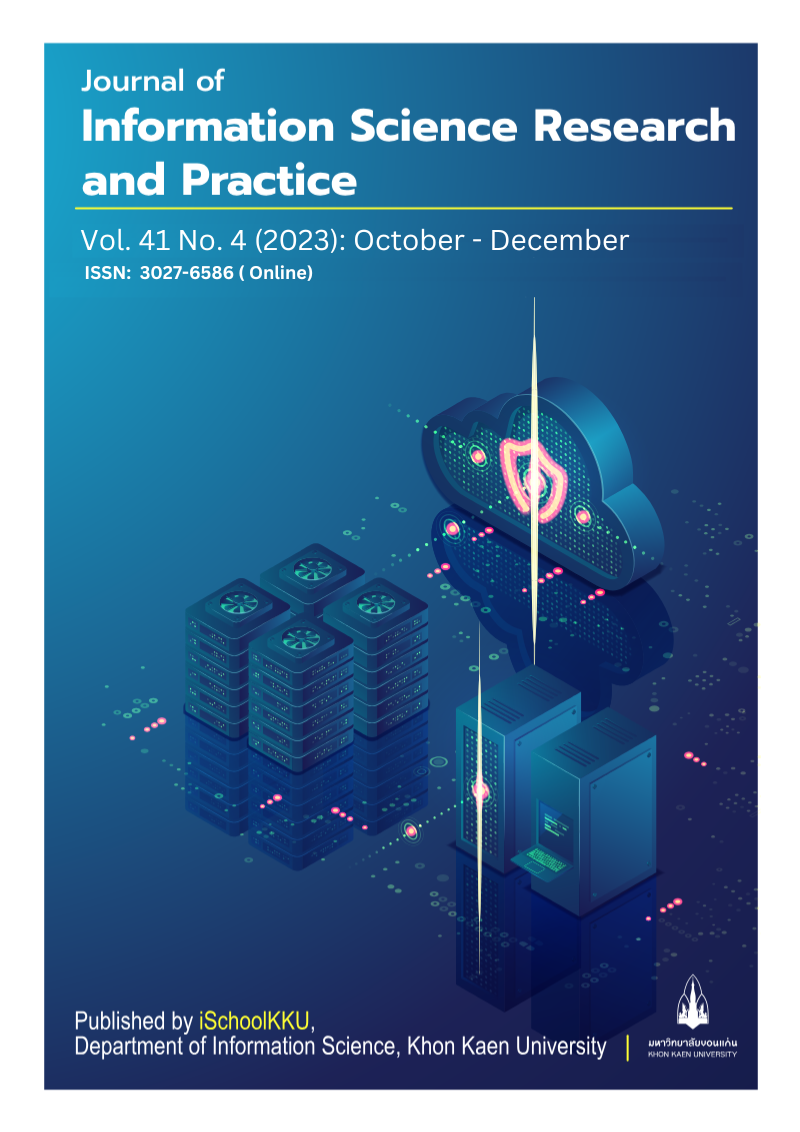Knowledge Organization Systems of Cultural for Beliefs, Traditions and Rituals of the Tai Yuan in Chiang Rai Province
DOI:
https://doi.org/10.14456/jiskku.2023.25Keywords:
Knowledge management, Knowledge base, Cultural Knowledge, Tai YuanAbstract
Purpose: This study aims to study, collect and develop the cultural knowledge on the beliefs, traditions and rituals of the Tai Yuan people in Chiang Rai Province.
Methodology: This research employs the knowledge management process, specifically the SECI Model, to facilitate the knowledge cycle. It involves synthesizing pertinent documents and research, along with gathering field data through in-depth interviews conducted with Academics, Local knowledge experts, and the Tai Yuan community. Additionally, the research aims to develop a comprehensive knowledge base by designing a proficient database management system and an accessible website for the purpose of storing and disseminating knowledge for widespread utilization. Furthermore, the quality assessment of the knowledge base will be conducted by experts in both cultural and information technology domains.
Findings: The knowledge management process on the concept of knowledge cycle (SECI Model) makes it possible to create new knowledge in relation to the beliefs, traditions and rituals of the Tai Yuan people in Chiang Rai Province. This model is straightforward to implement when developing a knowledge base that systematizes an effective and suitable body of knowledge. It enables the storage, maintenance, and improvement of content, facilitating easy and quick access to information. Consequently, it effectively disseminates knowledge widely, fostering an environment conducive to continuous learning, which, in turn, can be deeply ingrained within individuals.
Applications of this study: It is used to store and disseminate cultural information of the Tai Yuan people. In order to preserve the original knowledge and create new knowledge for generations easy to learn and understand the origins of their people, it is necessary to create awareness of cultural continuity is essential to ensure the perpetuation of their heritage, thus preventingits lossover time.
Downloads
References
Aiamsiriwong, O. (2015). Database systems. Bangkok: SE-EDUCATION.
Chotirat, S. (2018). Thai Yuan-Kon Mueang. Nonthaburi: Sripanya.
Khrueathai, P. (2009). Healthy families under Lanna traditions: Lifestyle and healthcare of the youth. Chiang Mai: Moradoklanna.
Leepreecha, P. (2017). Lanna Thepharak: from guardian ghost hall towards shrine statue and monument. Chiang Mai: Center for Research and Academic Service, Faculty of Social Sciences, Chiang Mai University.
Maneewan, T. (2007). Folk performing arts of Thai Yuan ethnic volume 1. Chiang Mai: Social Research Institute Chiang Mai University.
Nonaka, I. & Tekeuchi, H. (1995). The knowledge creating company. New York: Oxford University Press.
Sangsit, W., et.al. (2010). “Kwan” power of life Thai people: case study of Chiang Rai Province. Chiang Rai: Humanities: Chiang Rai Rajabhat University.
Wiphawin, N. (2004). Knowledge management and knowledge center. Bangkok: S.R. Printing Massproducts.








